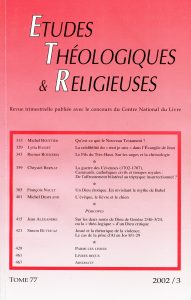Texte d’une conférence(1) qui relevait un défi : présenter en 50 minutes le « Nouveau Testament » prêché et enseigné durant 50 ans. Michel Bouttier décrit d’abord le livre (titre, manuscrits, dates, lieux, langues), puis passe aux livres qui le constituent, tels les instruments d’un orchestre. Deux ensembles, les Lettres apostoliques, les Récitatifs des Évangiles, et deux solistes, l’Apocalypse de Jean et les Actes des Apôtres. Ce qui frappe, c’est la fragilité, le caractère aléatoire d’un ouvrage inachevé, et la force irrésistible qui s’en dégage, celle de l’évangile qui marie les paroles de Jésus sur le Royaume et les paroles des témoins sur Jésus. Cette dynamique évoque celle de l’univers : un noyau d’une incroyable densité exerce attraction et répulsion (ici les écrits apocryphes), d’où jaillit son rayonnement.
Conférence prononcée le 22 mars 2001 au Centre Lacordaire de Montpellier, à l’occasion d’une exposition « La Bible pour le IIIe millénaire ». Nous avons conservé la tournure spontanée d’un exposé : le lecteur acceptera de devenir auditeur pour quelques instants.
This is the text from a lecture taking up the challenge of encompassing in a fifty minute analysis the various modes of preaching and teaching the New Testament that have been produced over the past 50 years. First the author deals with the book per se (titles, manuscripts sources, dates, places, idioms) ; he proceeds by surveying the various componentsas if they were musical instruments in an orchestra. As a result we are met with two ensembles, the Epistles of the Apostles, the recitatives from the Gospels, and two soloists, the Revelation of John the Apostle and the Acts of the Apostles. One cannot but be struck by the fragility, the arbitrariness of such an incomplete work and by the irresistible power it owns : the power of the Gospel which weaves the words of Jesus about the Kingdom of God with the words of the apostles about Jesus. Such a dynamics recalls that of the universe : there is an extremely dense mucleus, where its influence originates, which alternatingly attracts or repels (as with the Apocryphas).
p. 313-328
Auteur
BOUTTIER Michel
Michel BOUTTIER (1921-2015) était professeur de Nouveau Testament de l’Institut protestant de théologie, Faculté de Montpellier.
